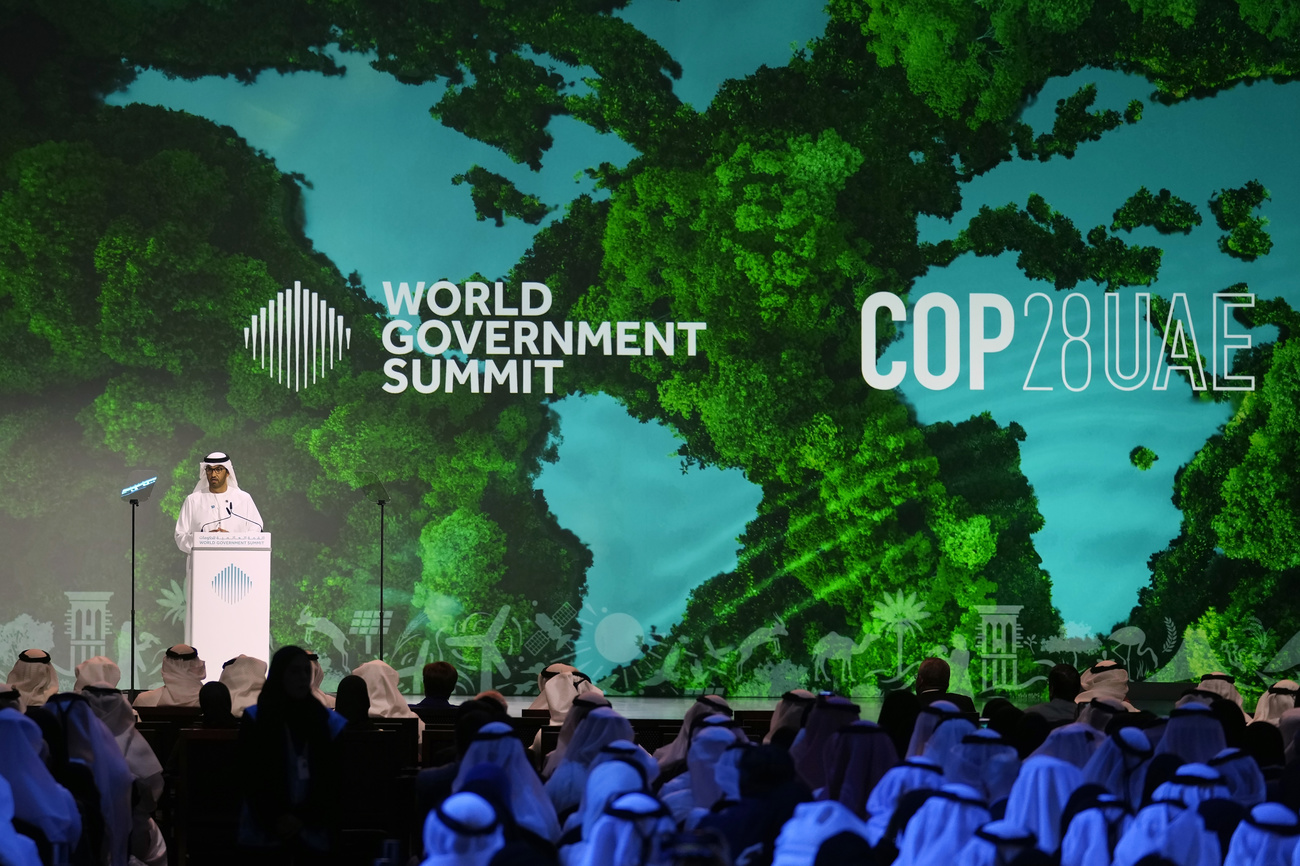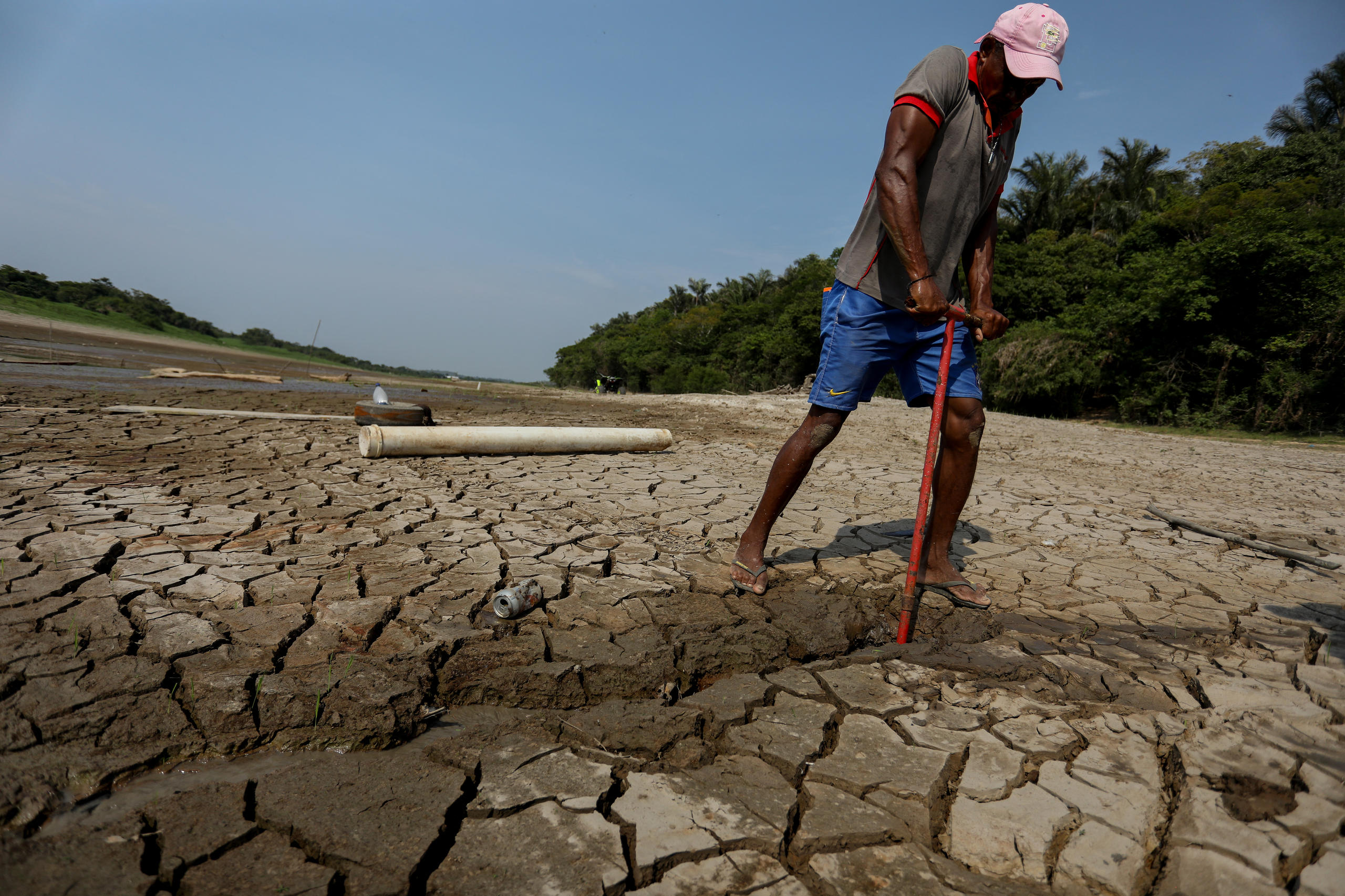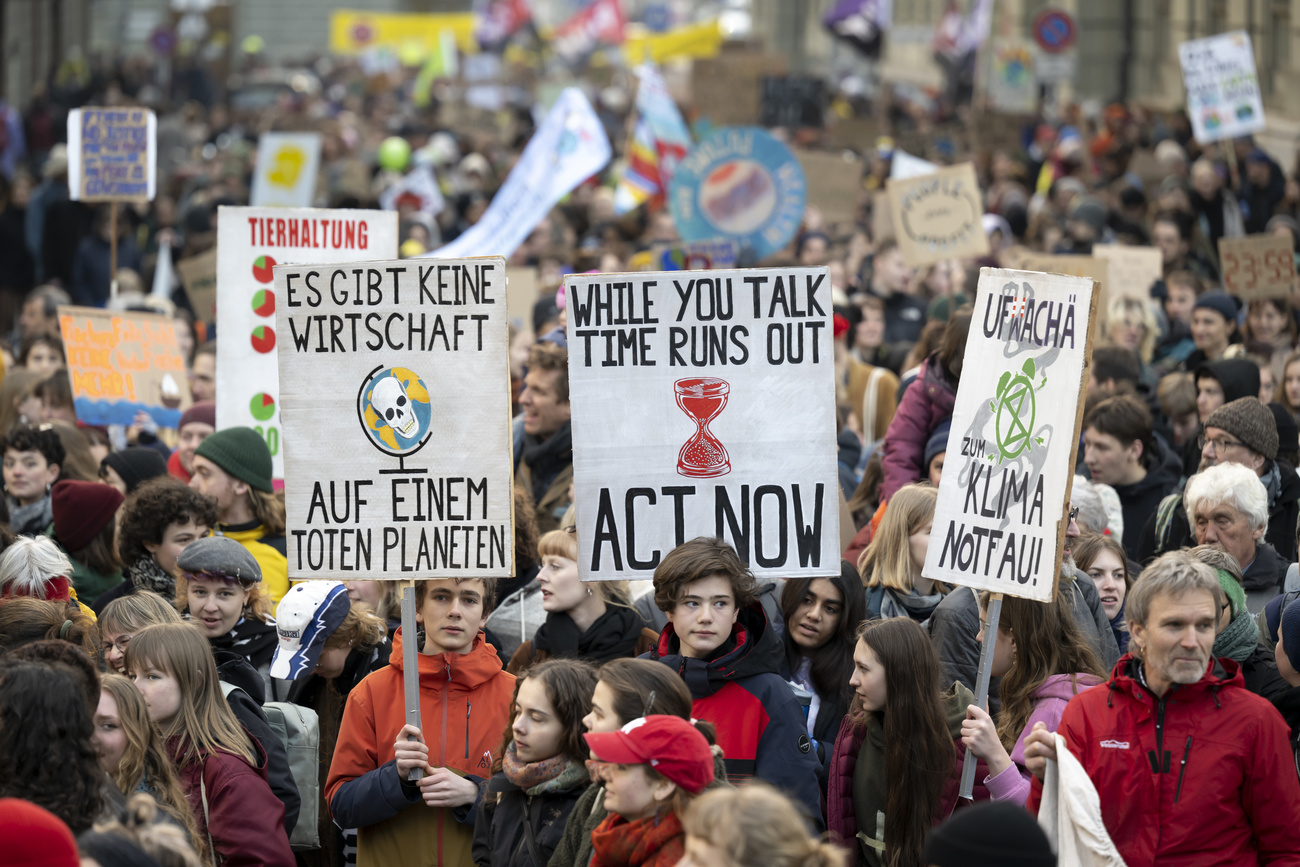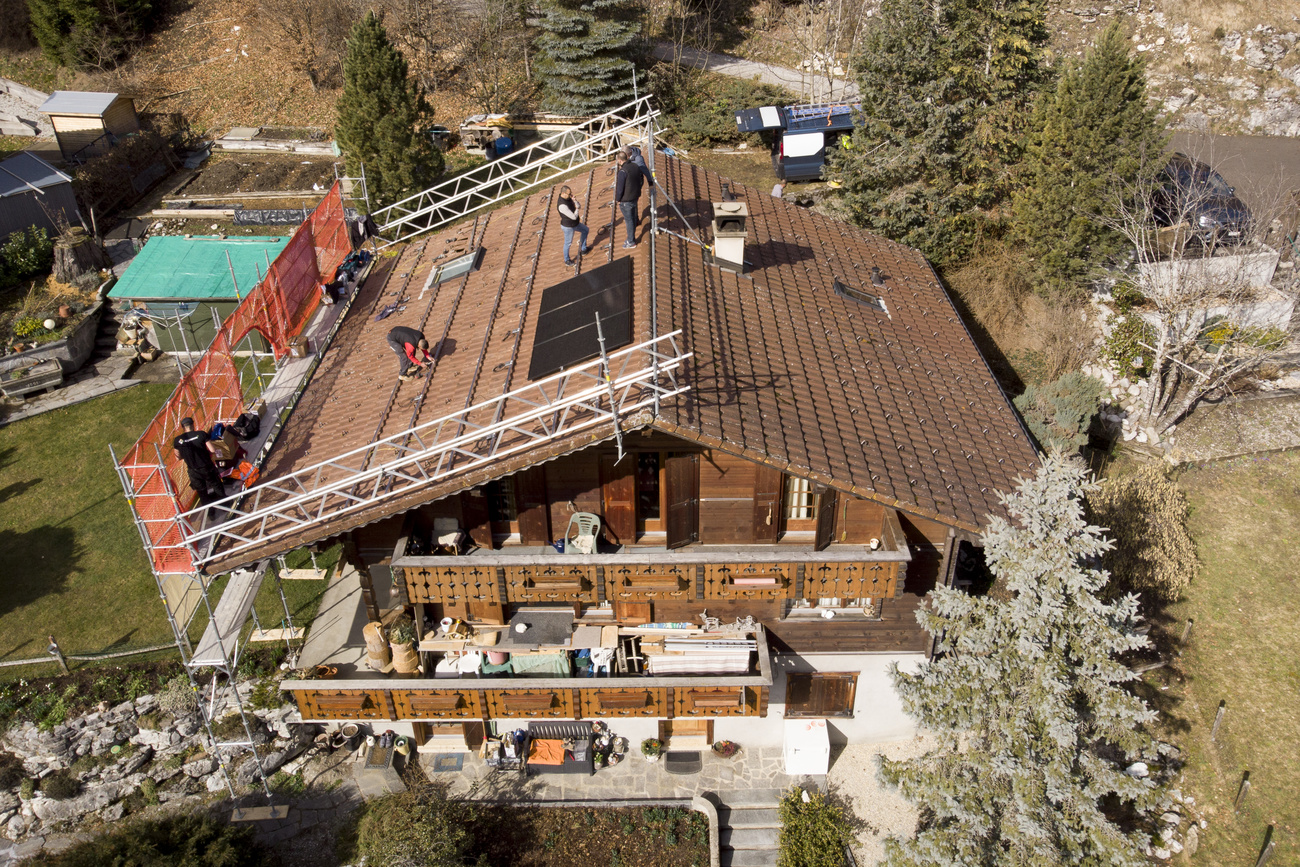
Offset scandals put Switzerland in the spotlight at COP28

With the COP28 climate talks about to begin in Dubai, countries will be under pressure more than ever to step up carbon-cutting commitments. The conference opens as carbon offsets are under scrutiny, pushing Switzerland to review its climate strategy.
On Thursday, more than 190 countries will begin the annual United Nations climate talks in Dubai, in the latest effort to rein in global emissions and provide support to the most vulnerable countries. At the end of what is expected to be the Earth’s hottest year on record, and with scientific warnings of more climate effects to come, they will need to find ways to put the Earth on track to achieve agreed climate goals.
After Sultan Al Jaber, the COP28 president and CEO of the Abu Dhabi National Oil Company, opens the two-week conference, countries will consider the results of the first Global Stocktake, or reality check on the impact of national carbon-cutting pledges on tackling climate change. They will then have to define strategies to keep international efforts in line with keeping the Earth’s temperature rise within +1.5°C above pre-industrial levels.
With the stocktake’s technical reportExternal link, published in September, showing that countries have made insufficient progress in cutting carbon emissions, Simon Stiell, executive secretary of UN Climate Change, stressed that “Cop28 must be a clear turning point. Governments must not only agree what stronger climate actions will be taken but also show exactly how to deliver them”.

Bern’s new negotiator
Amid challenges, Felix Wertli, Switzerland’s new climate ambassador, told journalists in Bern ahead of the conference that pushing for more ambition to keep within the 1.5°C limit was the top goal for the delegation at the COP28.
He said finding a strategy to exit fossil fuels while boosting strategies for renewable energies and energy efficiency were key. Wertli added that it was also important that the biggest emitters, many of whom included countries that are classified by the UN as developing but wealthy in terms of absolute GDP, such as China and Gulf states, contribute financially towards supporting other developing countries on the frontlines of severe climate impacts.
UN reports have shown that climate finance from developed to developing countries has been lagging, failing to hit the target of $100 billion (CHF88 billion) a year. A loss and damage fund, agreed a year ago to help compensate the poorest, most climate vulnerable for the effects of the climate crisis, is also expected to be discussed in Dubai, after an agreement to house it at the World Bank was reached this month.
Read more: Switzerland and COP
“There is a lot that we can do, regarding investments to shift sources of energy. That is an opportunity. The IPCC provides policy options to keep 1.5°C within reach,” Wertli told SWI swissinfo.ch. The IPCC, or Intergovernmental Panel on Climate Change, this year completed its latest series of scientific reports on the state of the climate on Earth, including its oceans and atmosphere, which includes a series of recommendations.
Wertli is replacing Franz Perrez, who had been Switzerland’s climate negotiator since 2010. His nomination came just months after Albert Rösti, of the right-wing Swiss People’s Party, which lobbied against the country’s climate law, took over as environment minister.
The ambassador assured that Switzerland would not shift its priorities within the climate negotiations as a result of the new head of the federal department.
Switzerland will continue to chair the Environmental Integrity Group (EIG), a negotiating group that also includes Georgia, Liechtenstein, Mexico, Monaco and South Korea.
How to cut emissions
According to the United Nations Environmental Programme (UNEP), the efforts that countries will have to take will be substantial. On November 20, it said countries would have to cut emissions by 42% by 2030 to avoid the current trajectory of temperatures rising by 2.5°C to 2.9°C by that date.
Beyond pushing for further cuts in the use and production of fossil fuels, one issue that has remained unresolved at the climate talks has been clear rules regarding carbon offsetting.
The video below explains how offsets work.
Such mechanisms, which may include forest preservation and tree planting and are widely used by companies to help them meet their climate targets, have come under scrutiny for the methods used to calculate the emissions they offset. The Paris climate agreement inked in 2015 specifies two types of offsets. Article 6 refers to both agreements between governments to cooperate on compensating emissions by supporting sustainable projects in developing countries that would have otherwise not taken place, and to the “voluntary” carbon market.
Switzerland pioneered the former when it concluded bilateral agreements with a number of countries in Latin America, Africa and Asia, while campaigning at the 2021 climate summit in Glasgow for more specifics how offset agreements should be implemented.
UN reports say more needs to be done
In November, a joint reportExternal link published by the UN Environment Programme (UNEP) and a number of think tanks highlighted the dissonance between stated national climate pledges – known as nationally determined contributions, or NDCs – and domestic policies. It says the top fossil fuel producing countries, including the UAE, plan to produce more oil, gas and coal in 2030 than now.
The World Meteorological Organization, meanwhile, reported that greenhouse gas emissions, including CO2, methane and nitrous oxide, responsible for global warming, hit new highsExternal link in 2022, just days after saying temperature rises this year were already brushing dangerously closeExternal link to the 1.5°C limit. The UN agency had forecast that it was “more likely than not” that the limit would be breached within five years.
Despite rising criticism on the effect of offsets to limit emissions, Wertli said measures included in the bilateral agreements included “enough safeguards”. He said these included the avoidance of double counting of the impact the projects have on avoidance of carbon emissions.
Offsetting snags
His comments come on the back of recent reports pointingExternal link to exaggerated claims involving Swiss-based carbon offset developer South Pole that have amplified concerns over market-based offsetting solutions.
Verra, the world’s largest carbon standard system, with which South Pole also worked, reportedlyExternal link issued over one billion credits – equivalent to one billion tonnes worth of CO2 – 90% of which were “phantom” or largely worthless. Verra has said that reporting about the company has been “off track”, while South Pole has severed ties with a major offset project in Zimbabwe at the centre of its scandal and disputes the allegations.

Critics say that companies and countries alike may rely too heavily on the credits generated from the system.
“The whole premise of offsetting is that you can continue business as usual and pay for credit that’s generated elsewhere. It’s a flawed premise,” Erika Lennon, senior attorney at the Center for International Environmental Law (CIEL), told SWI swissinfo.ch.
“What the climate needs is full rapid emissions reductions now, across the board of fossil fuels, and not keep emitting on the notion that we can buy an emissions reduction credit from some activity elsewhere,” she said, adding that countries and companies could also provide finance to developing countries for mitigation and adaptation projects.
Earlier this year, the UN-convened Net-Zero Asset Owner AllianceExternal link banned its members, which include major asset owners such as pension funds and insurance firms including Swiss Re, from using carbon offset schemes to achieve their emissions-cutting targets until 2030.
In the final weeks ahead of the COP28, a UN supervisory body responsible for overseeing a mechanism for carbon credits submitted recommendationsExternal link for guidance on carbon removals and mechanism methodologies for approval at the talks, a year after they were expected to do so.
Lennon remains reluctant towards the offsets. “You’re not reducing anything, and you’re not staying below 1.5°C. It’s not taking the action we need.”
Patrick Hofstetter, climate and energy policy head at the World Wide Fund for Nature (WWF) Switzerland and part of the wider Swiss negotiating team in Dubai, said that in Switzerland the government scheme would need a “reality check”. He said that the Klik Foundation, responsible for financing the bilaterally agreed offsets, is by its own admission lagging behind in helping the country, according to law, achieve its climate targets and reduce emissions by at least 50% by 2030.
The government, he said, would have to pitch in financially to help fill the gap.
“Understandably, with reports of flawed projects regarding voluntary carbon markets, some care should be taken before you agree to a project,” he warned.
Nonetheless, he said that in spite of the negative visuals of a major oil and gas producer hosting the climate talks, some hopeful signs ahead of the COP may be in sight.
He pointed to the recent talks between US President Joe Biden and Chinese President Xi Jinping at the Asia-Pacific Economic Cooperation summit on cooperation over climate issues, as well as the possibility that Al Jaber, as a representative of the OPEC oil producing countries bloc, may pressure Saudi Arabia “not to make this conference a disaster as Saudis may be more willing to agree than what they would had this conference been taking place outside an OPEC country”.
“That could make for an interesting constellation,” he added.
Edited by Virginie Mangin
This article was amended to add a reaction from South Pole.
More

More
Switzerland in 2050: portrait of a climate-neutral country

In compliance with the JTI standards
More: SWI swissinfo.ch certified by the Journalism Trust Initiative
































You can find an overview of ongoing debates with our journalists here . Please join us!
If you want to start a conversation about a topic raised in this article or want to report factual errors, email us at english@swissinfo.ch.